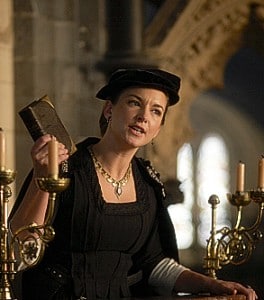
Chronicler and Windsor Herald Charles Wriothesley recorded the results of the hearing:
“The eigh tenth daie of June, 1546, were arraigned at the Guilde Certaine Hall, for heresee, Doctor Nicholas Shaxston, sometyme bishop of arraigned for Salisburie; Nicholas White, of London, gentleman; Anne Kerne[Kyme], alias Anne Askewe, gentlewoman, and wiffe of Thomas Kerne [Kyme], gentleman, of Lyncolneshire; and John Hadlam, of Essex, taylor; and were this daie first indited of heresie and after arraygned on the same, and their confessed their heresies against the sacrament of the alter without any triall of a jurie, and so had judgment to be brent[burnt].”
Martyrologist John Foxe shares Anne Askew’s own account of her condemnation at Guildhall:
“They said to me there, that I was a heretic, and condemned by the law, if I would stand in my opinion. I answered, that I was no heretic, neither yet deserved I any death by the law of God. But, as concerning the faith which I uttered and wrote to the council, I would not, I said, deny it, because I knew it true. Then would they needs know, if I would deny the sacrament to be Christ’s body and blood. I said, ‘Yea: for the same Son of God that was born of the Virgin Mary, is now glorious in heaven, and will come again from thence at the latter day like as he went up. And as for that ye call your God, it is a piece of bread. For a more proof thereof, (mark it when you list,) let it but lie in the box three months, and it will be mouldy, and so turn to nothing that is good. Whereupon I am persuaded that it cannot be God.’
“After that, they willed me to have a priest; and then I smiled. Then they asked me, if it were not good; I said, I would confess my faults unto God, for I was sure that he would hear with favour. And so we were condemned by a quest.”
“My belief which I wrote to the council was this: ‘That the sacramental bread was left us to be received with thanksgiving, in remembrance of Christ’s death, the only remedy of our soul’s recovery; and that thereby we also receive the whole benefits and fruits of his most glorious passion.’ Then would they needs know, whether the bread in the box were God or no: I said, ‘God is a Spirit, and will be worshipped in spirit and truth.’ Then they demanded, ‘Will you plainly deny Christ to be in the sacrament?’ I answered, that I believe faithfully the eternal Son of God not to dwell there; in witness whereof I recited again the history of Bel, Dan. xix., Acts vii. and xvii., and Matt. xxiv., concluding thus: ‘I neither wish death, nor yet fear his might; God have the praise thereof with thanks.'”
Anne goes on to describe how she was then racked at the Tower of London by Sir Richard Rich and Sir Thomas Wriothesley:
“Then they did put me on the rack, because I confessed no ladies or gentlewomen to be of my opinion, and thereon they kept me a long time; and because I lay still, and did not cry, my lord chancellor and Master Rich took pains to rack me with their own hands, till I was nigh dead.
“Then the lieutenant caused me to be loosed from the rack. Incontinently I swooned, and then they recovered me again. After that I sat two long hours reasoning with my lord chancellor upon the bare floor; where he, with many flattering words, persuaded me to leave my opinion. But my Lord God (I thank his everlasting goodness) gave me grace to persevere, and will do, I hope, to the very end.”
Anne Askew was burned at the stake on 16th July 1546. She had been so badly racked that she had to be carried to the stake on a chair the stake had a seat to support her body. She died for her faith and deserves to be remembered.
Click here to read more about her life and the events that led to her death. You can also read more of Anne’s own words in John Foxe’s Acts and Monuments Volume 5 page 537 onwards.
Also on this day in history…
- 1529 – Catherine of Aragon makes her first appearance at the Legatine Court at Blackfriars. Click here to read more about it.
Notes and Sources
- Wriothesley, Charles. A Chronicle of England during the reigns of the Tudors, from A.D. 1485 to 1559, p167.
- The Acts and Monuments of John Foxe: A New and Complete Edition with a preliminary dissertation by Rev. George Townsend, Volume 5, p546-547.